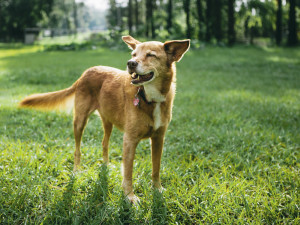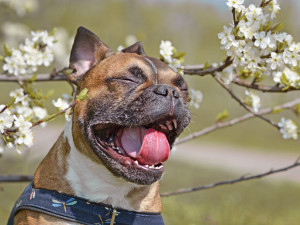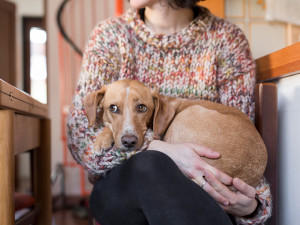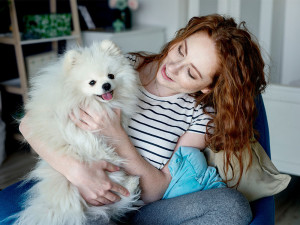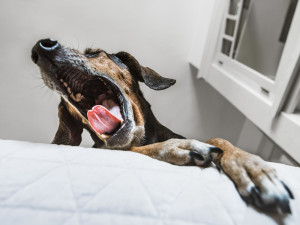Can Dogs Actually Get the Common Cold?
You’re sneezing, blowing your nose and stocking up on Lemsip. But is your pup at risk of catching your cold?
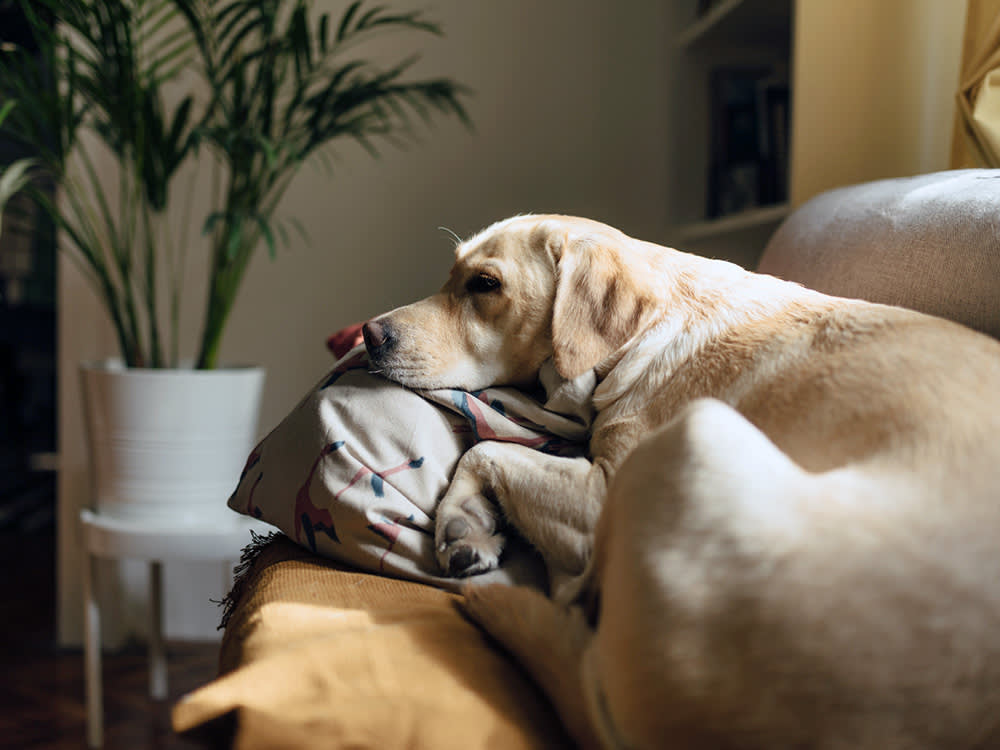
Share Article
Just like humans, dogs can experience cold-like symptoms, leaving pet parents concerned about their four-legged friend’s health. While dogs don’t get ‘colds’ in the same way we do, they can suffer from respiratory infections – or upper respiratory infection (URI) as it’s called in animals – that cause similar symptoms. It’s not nice to see your pet sniffling and coughing away, so we looked into how dogs can catch respiratory illnesses, the signs to look out for and safe ways to help your pet feel better, so that it means only a short period of feeling under the weather.
What causes a cold in dogs?
There are several viruses and bacteria that can cause cold-like symptoms in dogs. The main ones cause a condition called Canine Infectious Respiratory Disease complex (CIRDc). As the name suggests, it’s quite complex! It is more commonly known as ‘Kennel Cough’, or Canine Infectious Tracheobronchitis. The contagious infection affects the airways of dogs and can be caused by:

Get (totally free) deals for food, treats, accessories, tech and way more pet parenting must-haves.
Bordetella bronchiseptica bacteria.
Parainfluenza virus.
Canine Respiratory Coronavirus (different to Covid-19).
Mycoplasma.
These germs can cause an initial infection. Opportunistic bacteria that usually don’t cause a problem then take advantage of the situation and cause a secondary infection on top of the initial infection. It is quite common to have more than one organism diagnosed if tested, so treatment can be varied and is always patient specific. Usually though, a cough in a dog is self-limiting and goes away on its own without needing treatment.
Can dogs get colds from humans?
Luckily, no. The typical viruses that cause human colds can’t be passed on to dogs and vice versa. Even though some germs have similar names, they are almost always species specific and can only infect those targeted. So if you’re feeling ill and vegging in front of the telly with a cold, you don’t need to worry about cuddling up with your canine companion.
However, diseases can be passed from dog to dog. These germs can be spread through airborne particles from coughs and sneezes, direct contact nose to nose, and contaminated objects (bowls, leads and sometimes our skin and clothes). So colds are more likely to spread in places where lots of dogs mingle (this is where Kennel Cough got its name, as it was commonly connected to housing dogs together).
URI’s will spread to other dogs in your family easily, particularly the young, old or those with lower immunity. It is advised to keep young, unvaccinated puppies away from other dogs to start with, while they build their immunity. While you can’t pass your cold on to your dog, after being in contact with a poorly pet, do remember to wash your hands thoroughly and change before stroking your own four-legged friend so you don’t pass on a cold manually through indirect contact.
What are the symptoms of colds in dogs?
The symptoms we see in dogs when they have a cold are very similar to ours:
A dry or productive cough – often coughing up foamy mucus.
Runny nose.
Watery eyes or more crusty ‘sleep’ by eyes.
Lethargic or not as excitable as usual.
Reduced appetite.
Enlarged lymph nodes under their jaw.
Some of these symptoms are so mild that it’s only when our pet is back to normal that we realise they weren’t feeling quite themselves. Sometimes, however, their cough can sound like your cute little puppy has transformed into a roaring T-Rex. A canine cough doesn’t sound like a human’s, it is more like a honk or ‘heh’ noise and can sometimes end with a ‘yak’ noise and bring up frothy mucus. When infected, this coughing can be triggered by your dog pulling on the lead or when barking and excited.
What else could look like a cold in dogs?
While a cold is usually self-limiting and clears up on its own, there are other issues that can cause similar symptoms and might require a bit more attention. Secondary infections that develop while your dog’s immune system is already busy can make symptoms worse or lengthen the illness. Typically, infections can last from five days to four weeks, most resolving within two–three weeks. If symptoms continue for longer than this or if they’re worsening rather than improving, it’s best to get advice from your vet to see if there is anything else going on and whether they need any additional treatment.
Other conditions that can look similar are:
retching or regurgitation
cough caused by heart conditions
distemper (now very rare in the UK)
laryngeal paralysis (vocal cords not opening fully)
Most of these conditions will need further testing from your vet to diagnose, so keep an eye on your pup and if there doesn’t seem to be much improvement then give them a call. However, if you suspect your dog is having trouble breathing at any point then call your vet right away.
How can I treat my dog’s cold?
When they feel under the weather, dogs need rest and some tender loving care. Give them space if needed as, like some of us, they can get grumpy when sick, but there are some things that you can do to help them feel better sooner.
If they have a reduced appetite, one way to tempt them is to warm up their food and soften it with some warm water or gravy. Another way to soothe their sore throat is with a tiny bit of pure honey, if their diet allows. To ease their cough, it can be helpful to bring them into the bathroom while the hot shower runs to let them breathe in some of that steam. There are some treatments your vet may prescribe after seeing your pet, such as anti-inflammatory medications or antibiotics to treat secondary bacterial infections if present.
When should you worry about cold symptoms in dogs?
If you are at all concerned by symptoms your dog is showing it is always best to contact your vet, even if it’s for peace of mind that what they are experiencing is just a cold. Usually there is no need for treatment, however there are a few signs that can indicate something more serious is going on:
Difficulty breathing. Always call your vet if you think your pet can’t breathe normally, if their breathing sounds different or if they are wheezing.
Abnormal snot. Clear fluid is normal in dogs but any green or creamy discharge from the nose should be looked at.
Any blood seen in mucus. ‘Frank’ red blood or darker spots that look like coffee grounds in the mucus they cough up should be investigated.
If your dog is older or immunosuppressed. Just like people any dog that has an underlying condition or reduced immunity is at a higher risk from infection.
There’s plenty we can do to help our furry friends feel better when a cold hits, but prevention is really the best way forwards. If your dog has a cold, keep them away from other dogs to minimise the spread and wash bowls and any shared beds or leads thoroughly. Thankfully, we also have protection against some of the wider causes of URI through vaccinations (distemper, parainfluenza and Bordetella bronchiseptica) and so even after the important puppy vaccinations it is best to keep up with annual boosters. Just like with human flu vaccinations it doesn’t completely eliminate the possibility of catching it, but it does reduce the risk and also the severity of the infection.
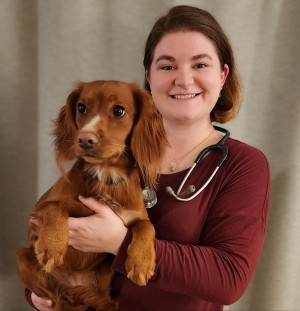
Dr Josephine Corrick, BVMSci, BSc, MRCVS
Dr Josephine Corrick, BVMSci, BSc, MRCVS is a veterinary surgeon based in the south of Scotland where she has been since graduating from the University of Surrey. She enjoys working in general practice treating small animals. Her particular interests include diagnostic imaging and the treatment of wildlife.
Having found a passion for veterinary medicine after doing a degree in Equine Sports Science she still enjoys including horses in her life by spending time with her highland ponies. Alongside her clinical work, she helps run a smallholding caring for rare breed sheep and exploring the Scottish countryside with her young Cocker Spaniel.
Related articles
![shy dog frightened in the arms of the owner. this brown mixed-breed hound puppy has a sweet gaze. the female owner has a wool sweater]()
Why Is My Dog Shaking? Causes and Treatment
A vet explains why the weather isn’t always to blame
![woman with red hair holds senior Pomeranian dog]()
Senior Dog Care
Is your dog getting older? As dogs age, it’s important to recognise both physical and mental changes they may be experiencing and learn how to cater to those needs
![A dog coughing]()
Kennel Cough Is the Worst. Here’s What You Need to Know About it
Kennel cough has been making headlines, but you can prevent your pup from catching this super-contagious disease. (Hint: there’s a vaccine)
![French bulldog puppy looking scared at vet]()
10 Things to Ask At Your First Vet Visit
There are no stupid questions when it comes to your dog’s health
![Dog laying down in dog bed and coughing]()
When a Cough Isn’t Just a Cough
Seven reasons to be concerned when your dog is coughing, according to veterinarians
